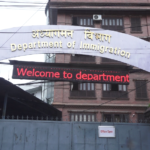Former Chief Justice Sushila Karki, 73, renowned for her staunch anti-corruption stance, was sworn in as Nepal’s interim Prime Minister on September 12, 2025. This appointment, announced by President Ramchandra Paudel’s office, marks a historic milestone as Karki becomes the first woman to lead the country’s government.
At a ceremony at the President’s Office on Friday, she took the oath of office and secrecy from President Ram Chandra Paudel and then signed the official document. Following the swearing-in, President Paudel congratulated Karki and wished her a successful tenure, expressing hopes for the nation’s success and the well-being of its people. “Congratulations and many best wishes. May you be successful. May the country be successful. May the people prosper,” President Paudel said.
Vice President Ram Sahay Prasad Yadav and other high-ranking officials from constitutional and diplomatic bodies were also in attendance to extend their congratulations and well-wishes. Karki’s appointment comes with a significant responsibility: she is tasked with holding new elections within the next six months. Her appointment as interim Prime Minister was made by President Paudel under Article 61 of the Constitution.
The decision comes in the wake of intense, youth-led anti-corruption protests that have gripped the Himalayan nation, resulting in at least 51 deaths, over 1,300 injuries, and billions of dollars in damages to public infrastructure. Simultaneously, Parliament was dissolved, paving the way for an interim administration to restore order and address the protesters’ demands for systemic reform.
The unrest began escalating on September 8, 2025, when the government of Prime Minister K.P. Sharma Oli imposed a controversial ban on social media platforms. The ban ignited widespread fury among Nepal’s Gen Z population—young activists frustrated by entrenched corruption, nepotism, economic stagnation, and a lack of job opportunities in the impoverished nation nestled between India and China.
What started as peaceful demonstrations quickly spiraled into Nepal’s worst violence in decades. Protesters clashed with security forces, leading to a deadly police crackdown that claimed at least 21 lives. The following day, mobs set fire to key government buildings, including Parliament House, the President’s Office, the Prime Minister’s residence, and the homes of senior political leaders.
Thousands of buildings were looted or burned, with damages estimated in the billions of dollars, crippling major state institutions and exacerbating the chaos. Over 12,500 prisoners escaped from facilities during the mayhem, adding to the security crisis as the army was deployed to patrol the streets of Kathmandu and other cities.
Prime Minister Oli—a 73-year-old four-time leader of the Communist Party of Nepal—resigned on September 9. His departure created a power vacuum, with protesters demanding not just the lifting of the social media ban (which was swiftly rescinded) but a complete overhaul of the corrupt political elite.
Gen Z organizers, emphasizing neutrality and excluding any youth with ties to political parties, held virtual meetings and backed Karki as their representative to lead the interim government. Born on June 7, 1952, in Biratnagar, eastern Nepal, she studied political science and law, later pursuing advanced studies at Banaras Hindu University in India, where she met her husband, Durga Prasad Subedi, a prominent youth leader in the Nepali Congress party involved in the 1973 Royal Nepal Airlines hijacking incident.
Karki began her legal career in 1979 as an advocate, rising to become a senior lawyer by 2008 and a Supreme Court justice in 2010. She made history on July 11, 2016, as Nepal’s first female Chief Justice. Her tenure was marked by bold anti-corruption rulings that often put her at odds with powerful politicians.
Notably, she convicted then-Information Minister Jaya Prakash Gupta in 2012 for graft—the first sitting minister jailed for corruption in Nepal—and annulled the appointment of Lokman Singh Karki as head of the anti-corruption commission due to political interference. She also presided over cases involving corruption in UN peacekeeping missions and the controversial Nijgadh airport project.
However, her impartiality drew backlash; in 2017, lawmakers from the Nepali Congress and CPN (Maoist Centre) filed an impeachment motion accusing her of bias after she ruled against executive overreach in police appointments, leading to her suspension (though not full impeachment).
Karki’s lack of direct political or executive experience has raised questions about her ability to navigate Nepal’s complex governance, but her reputation as an “honest, fearless, and unshaken” figure—free from party affiliations—has made her a unifying symbol.
Support NepYork – Your Nonprofit News Media for the Nepali Community
NepYork, a 501(c)(3) nonprofit, is the Showcase of Nepalis in New York, delivering timely local news and vital resources on immigration, housing, taxes, health, business, and more. Our mission is to safeguard community journalism, amplify the voices of Nepali immigrants in NYC, and foster understanding, solidarity, and empowerment.
By donating to NepYork, you help us enhance participation in democracy, improve access to essential resources, and share authentic stories that reflect the vibrant, diverse experiences of Nepali New Yorkers. Together, we can connect, inform, and empower our community. Every contribution ensures these voices are heard and valued.
Donate today to keep Nepali stories alive and thriving in New York!




